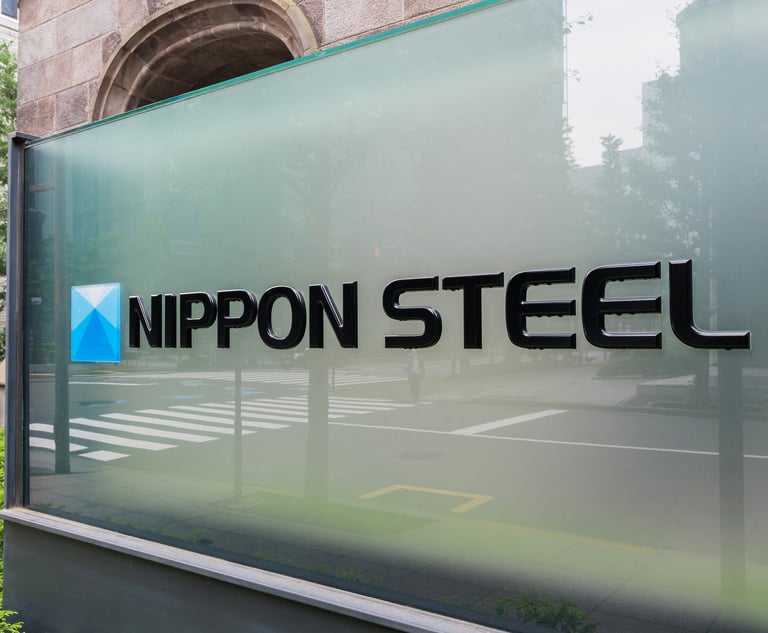Metalworker Settles Arm Amputation Claims for $5M in Case Complicated by Post-'Tincher' Products Liability Questions
Unsettled questions of law, including whether comparative negligence arguments should be allowed into products liability cases in the wake of the game-changing Tincher v. Omega Flex decision, helped bring all parties to the negotiating table.
January 14, 2020 at 03:52 PM
5 minute read
 Photo: belushi/Shutterstock.com
Photo: belushi/Shutterstock.com
A worker whose arm was partially amputated by a piece of heavy machinery at a metal fabrication plant has agreed to settle his products liability claims against five companies for $5 million.
Ryan Boylan, who was 37 at the time of his injury, entered into a settlement agreement with the design and manufacturing companies Jan. 9 following mediation before retired Philadelphia Court of Common Pleas Judge Annette Rizzo. According to Alan Feldman of Feldman Shepherd Wohlgelernter Tanner Weinstock Dodig, who represented the plaintiffs along with attorneys Daniel Mann and Edward Goldis, the defendants did not disclose how much each defendant contributed to the settlement, but the accord included the waiver of a more than $555,000 workers' compensation lien.
Feldman said he felt Boylan had good chances of success at trial, but unsettled questions of law, including whether comparative negligence arguments should be allowed into products liability cases in the wake of the game-changing Tincher v. Omega Flex decision, helped bring all parties to the negotiating table.
"While we had high hopes and expectations that a jury verdict could return a larger sum, I think we were all concerned about the legal issues and how they would be resolved," Feldman said.
Regarding the settlement, Feldman said it should provide significant benefits to Boylan, who has suffered from depression and addiction after the amputation injury.
"My client was a very decent and good guy. He was only 37 when this happened," Feldman said. "This is a life-changing outcome for him in this case. We hope very much, and we're confident that he will be able to turn his life around with this settlement."
According to Boylan's mediation memo, the incident occurred Dec. 23, 2014, while he was working at a Reading Alloys facility in Robesonia, Pennsylvania. The company, which is owned by Ametek, a defendant in the lawsuit, produces master alloys and metal pieces for a variety of industries, Boylan said in his memo.
According to the memo, Boylan worked near the load-end of a conveyor system on the so-called "melt line," where large metal boxes moved back and forth from the load-end to the production line.
The memo said Boylan had dropped a sparkler device into the conveyor system. In an attempt to retrieve it, Boylan reached down into the system, which is when his arm was caught by a moving box. According to the memo, his dominant right arm was partially severed above the elbow, and he was taken to Reading Hospital, screaming in pain. Later that day, Boylan underwent a "guillotine amputation," and had three additional surgeries in the following weeks.
Boylan sued Ametek, which owned the facility; Han-Tek, which designed the melt line system; Wily Machine, which sold component parts on the melt line; Acquajet, which designed and built the component parts; and SSM Group, which designed another component part. Boylan argued that the system had been negligently designed because there had been a four-inch gap in the melt line near the load end, which was left unguarded.
Ametek challenged the suit, arguing that it was Boylan's employer, and therefore immune under the Workers' Compensation Act. The company also noted that it had paid Boylan more than $553,000 in workers' compensation benefits, and was continuing to pay Boylan's medical benefits.
The company filed summary judgment motions on the issue, and, although it lost those motions, it had sought interlocutory appeals at the Superior Court. The latest effort to get interlocutory review by the Superior Court was denied in December.
The companies that designed and manufactured the component parts blamed Han-Tek in their mediation memos, and Han-Tek contended that it had not been contracted to provide additional guarding on the conveyor system.
All the defendants also argued that Boylan was comparatively negligent.
In the wake of the Pennsylvania Supreme Court's 2014 decision in Tincher, questions have remained about whether defendants are able to raise a plaintiff's comparative negligence as a defense.
The fact that the defendants might try to raise those issues was a challenge in the case, according to Feldman.
And another complication in the case, according to Feldman, was that an email from Reading Alloys to Han-Tek said that Reading Alloys agreed to take responsibility for any guarding that was necessary. Feldman noted that longstanding case law in Pennsylvania holds that product designers and manufactures have a non-delegible duty to ensure their products are safe, however, he said, defendants could also try to dispute that longstanding in the wake of Tincher.
"All those legal issues contributed towards persuading everyone that resolution by settlement was the best closure," Feldman said.
Ultimately, Feldman said, plaintiffs were able to make their case through extensive discovery and legal briefing, with Goldis and Mann taking 15 depositions and handling all the motions, Feldman said.
Richard Stabinski of Weber Gallagher Simpson Stapleton Fires & Newby represented Aquajet Services. William Resch of McCormick & Priore represented Wily Machine. Brian Corcoran of Reilly, McDevitt & Henrich represented SSM Group. Patrick Hasson of Styliades, Mezzanotte & Hasson represented Han-Tek, and Cathleen Rebar of Rebar Bernstiel represented Ametek. None of the defense attorneys returned a message seeking comment.
This content has been archived. It is available through our partners, LexisNexis® and Bloomberg Law.
To view this content, please continue to their sites.
Not a Lexis Subscriber?
Subscribe Now
Not a Bloomberg Law Subscriber?
Subscribe Now
NOT FOR REPRINT
© 2025 ALM Global, LLC, All Rights Reserved. Request academic re-use from www.copyright.com. All other uses, submit a request to [email protected]. For more information visit Asset & Logo Licensing.
You Might Like
View All
Pittsburgh's Reed Smith, K&L Gates Join Fight to Save Nippon Steel-U.S. Steel Merger

Kraft Heinz Hires GC of Industrial Manufacturer as Legal Chief

Mastercard CLO Exits After Just 14 Months, Takes Legal Reins of Laser Manufacturer
3 minute read
Black Worker Who Allegedly Faced Racist Harassment At Manufacturing Job Sues Employer, Staffing Company
Law Firms Mentioned
Trending Stories
- 1Uber Files RICO Suit Against Plaintiff-Side Firms Alleging Fraudulent Injury Claims
- 2The Law Firm Disrupted: Scrutinizing the Elephant More Than the Mouse
- 3Inherent Diminished Value Damages Unavailable to 3rd-Party Claimants, Court Says
- 4Pa. Defense Firm Sued by Client Over Ex-Eagles Player's $43.5M Med Mal Win
- 5Losses Mount at Morris Manning, but Departing Ex-Chair Stays Bullish About His Old Firm's Future
Who Got The Work
J. Brugh Lower of Gibbons has entered an appearance for industrial equipment supplier Devco Corporation in a pending trademark infringement lawsuit. The suit, accusing the defendant of selling knock-off Graco products, was filed Dec. 18 in New Jersey District Court by Rivkin Radler on behalf of Graco Inc. and Graco Minnesota. The case, assigned to U.S. District Judge Zahid N. Quraishi, is 3:24-cv-11294, Graco Inc. et al v. Devco Corporation.
Who Got The Work
Rebecca Maller-Stein and Kent A. Yalowitz of Arnold & Porter Kaye Scholer have entered their appearances for Hanaco Venture Capital and its executives, Lior Prosor and David Frankel, in a pending securities lawsuit. The action, filed on Dec. 24 in New York Southern District Court by Zell, Aron & Co. on behalf of Goldeneye Advisors, accuses the defendants of negligently and fraudulently managing the plaintiff's $1 million investment. The case, assigned to U.S. District Judge Vernon S. Broderick, is 1:24-cv-09918, Goldeneye Advisors, LLC v. Hanaco Venture Capital, Ltd. et al.
Who Got The Work
Attorneys from A&O Shearman has stepped in as defense counsel for Toronto-Dominion Bank and other defendants in a pending securities class action. The suit, filed Dec. 11 in New York Southern District Court by Bleichmar Fonti & Auld, accuses the defendants of concealing the bank's 'pervasive' deficiencies in regards to its compliance with the Bank Secrecy Act and the quality of its anti-money laundering controls. The case, assigned to U.S. District Judge Arun Subramanian, is 1:24-cv-09445, Gonzalez v. The Toronto-Dominion Bank et al.
Who Got The Work
Crown Castle International, a Pennsylvania company providing shared communications infrastructure, has turned to Luke D. Wolf of Gordon Rees Scully Mansukhani to fend off a pending breach-of-contract lawsuit. The court action, filed Nov. 25 in Michigan Eastern District Court by Hooper Hathaway PC on behalf of The Town Residences LLC, accuses Crown Castle of failing to transfer approximately $30,000 in utility payments from T-Mobile in breach of a roof-top lease and assignment agreement. The case, assigned to U.S. District Judge Susan K. Declercq, is 2:24-cv-13131, The Town Residences LLC v. T-Mobile US, Inc. et al.
Who Got The Work
Wilfred P. Coronato and Daniel M. Schwartz of McCarter & English have stepped in as defense counsel to Electrolux Home Products Inc. in a pending product liability lawsuit. The court action, filed Nov. 26 in New York Eastern District Court by Poulos Lopiccolo PC and Nagel Rice LLP on behalf of David Stern, alleges that the defendant's refrigerators’ drawers and shelving repeatedly break and fall apart within months after purchase. The case, assigned to U.S. District Judge Joan M. Azrack, is 2:24-cv-08204, Stern v. Electrolux Home Products, Inc.
Featured Firms
Law Offices of Gary Martin Hays & Associates, P.C.
(470) 294-1674
Law Offices of Mark E. Salomone
(857) 444-6468
Smith & Hassler
(713) 739-1250





